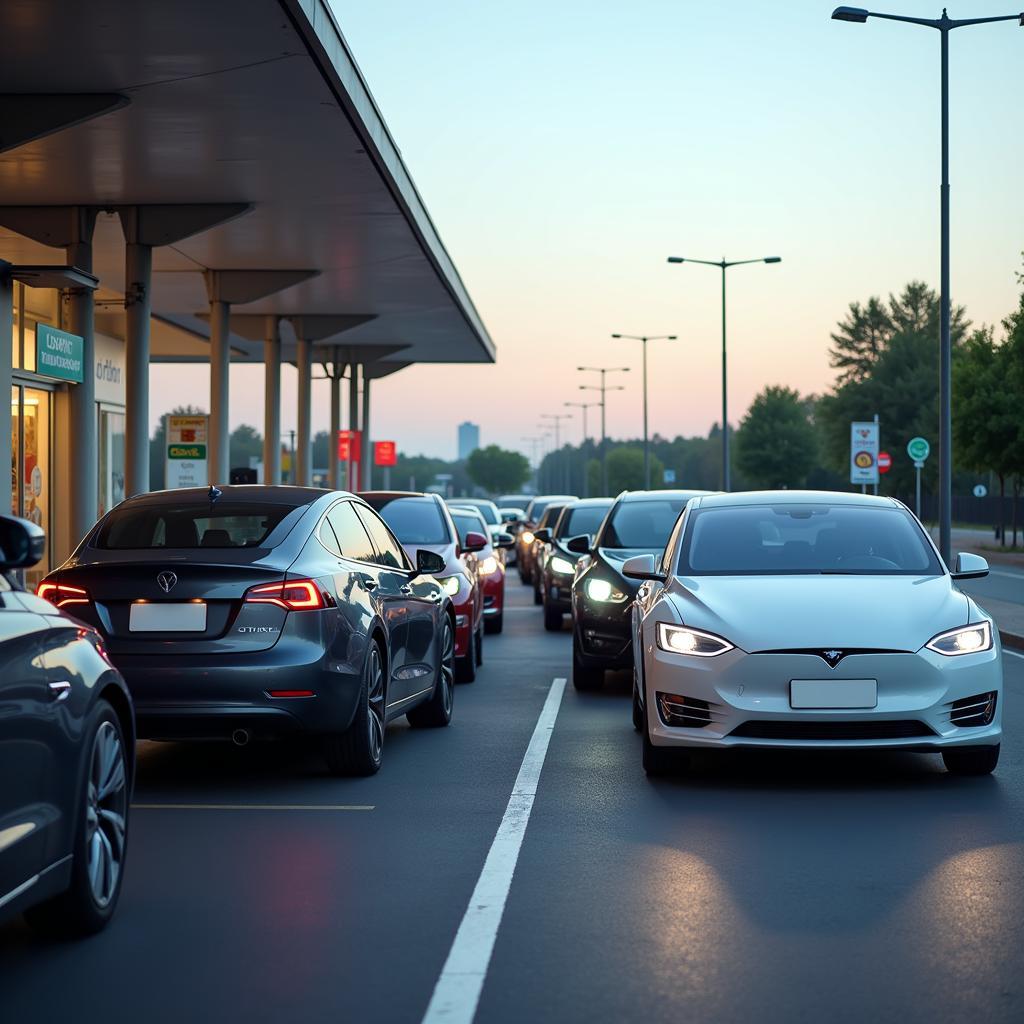Electric cars are often touted as the solution to our environmental woes, but the question “Why Are Electric Cars The Problem?” highlights a growing awareness of the complexities surrounding this seemingly green technology. While they offer undeniable advantages, it’s crucial to acknowledge the potential downsides and address the challenges they present.
 Electric Car Charging Challenges: Long queues and limited availability of charging stations can be a significant problem for electric car owners.
Electric Car Charging Challenges: Long queues and limited availability of charging stations can be a significant problem for electric car owners.
One key area of concern is the environmental impact of battery production. Mining for rare earth minerals, a crucial component of EV batteries, can cause significant environmental damage, including soil erosion and water contamination. Furthermore, the manufacturing process itself is energy-intensive and can contribute to greenhouse gas emissions. While the overall lifecycle emissions of electric cars are generally lower than gasoline-powered vehicles, it’s essential to acknowledge and address the environmental footprint of battery production. what problem does electric cars solve
The Charging Infrastructure Conundrum
Another frequently cited issue is the limited charging infrastructure. While the number of charging stations is increasing, it still lags behind the growing demand for electric vehicles. This can lead to “range anxiety” – the fear of running out of charge before reaching a charging station – and can make long-distance travel challenging. Furthermore, charging times can be significantly longer than refueling a gasoline car, adding to the inconvenience.
The Cost Factor: Are Electric Cars Truly Affordable?
The initial cost of electric cars can be significantly higher than comparable gasoline-powered vehicles, although government incentives and tax credits can help offset this difference. However, the long-term cost of ownership, including lower fuel and maintenance costs, can make electric cars a more economical choice over time. But the upfront investment remains a barrier for many potential buyers.
The Electricity Source: Green or Not?
The environmental benefits of electric cars are also dependent on the source of electricity used to charge them. If the electricity comes from coal-fired power plants, the overall emissions reduction may be less significant. Ideally, electric cars should be charged using renewable energy sources like solar or wind power to maximize their environmental impact. electric cars are the solution to modern transport problems
“The real environmental benefit of electric cars depends on a clean power grid,” says Dr. Eleanor Vance, a leading researcher in sustainable transportation at the University of California, Berkeley. “Simply switching to electric vehicles without addressing the source of our electricity won’t solve the problem.”
Battery Life and Disposal: A Growing Concern
The lifespan of electric car batteries is another important consideration. While battery technology is constantly improving, batteries eventually degrade and need to be replaced, which can be expensive. Furthermore, the disposal of used batteries presents environmental challenges, as they contain hazardous materials that need to be handled and recycled properly.
Performance and Practicality: Meeting Diverse Needs
While electric cars have made significant strides in terms of performance, some models may still lack the range or towing capacity required by some drivers. Furthermore, the availability of charging infrastructure can be a limiting factor for those living in apartments or without access to home charging.
What About Hybrids and Hydrogen?
Alternatives to purely electric vehicles, such as hybrid cars and hydrogen fuel cell vehicles, offer different approaches to reducing emissions. Hybrids combine a gasoline engine with an electric motor, offering improved fuel efficiency without the need for charging infrastructure. what problems do hybrid cars have. Hydrogen fuel cell vehicles use hydrogen to generate electricity, producing only water vapor as a byproduct. problems with using hydrogen in cars. However, both technologies face their own set of challenges, including cost, infrastructure development, and efficiency. car problems and solutions
“Exploring diverse solutions is essential for a sustainable transportation future,” states automotive engineer, Mr. James Miller, CEO of GreenTech Mobility Solutions. “While electric cars offer a compelling path forward, we must continue to innovate and invest in other promising technologies like hydrogen fuel cells and hybrids.”
In conclusion, while electric cars offer a promising solution to many transportation challenges, it’s crucial to acknowledge and address the potential downsides. The environmental impact of battery production, the limitations of charging infrastructure, and the cost of ownership are all factors that need to be considered. By understanding “why are electric cars the problem” for some, we can work towards developing more sustainable and comprehensive solutions for the future of transportation. Connect with us at AutoTipPro for more assistance. Our phone number is +1 (641) 206-8880, and our office is located at 500 N St Mary’s St, San Antonio, TX 78205, United States.






Leave a Reply